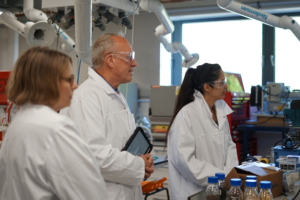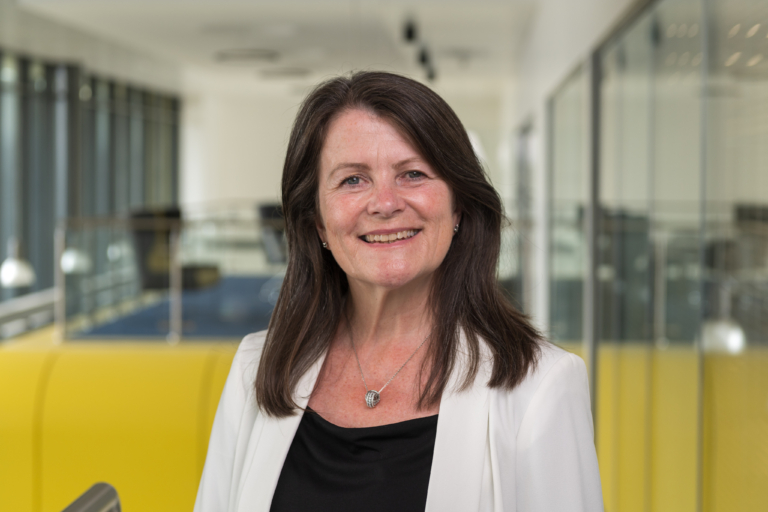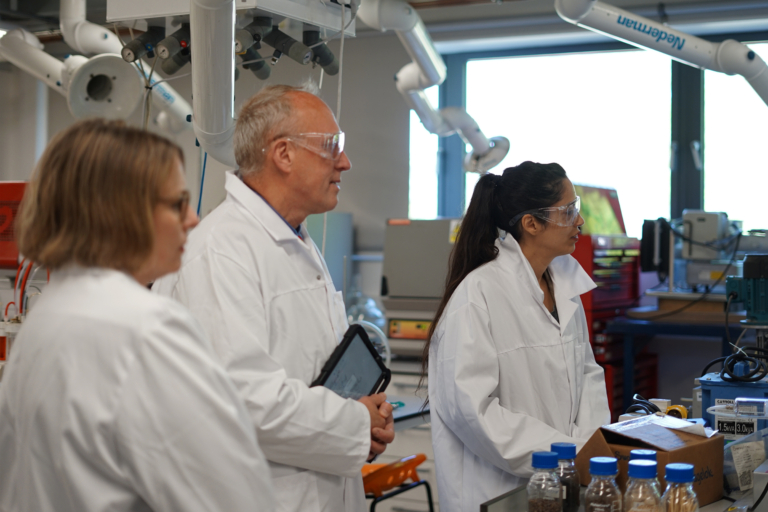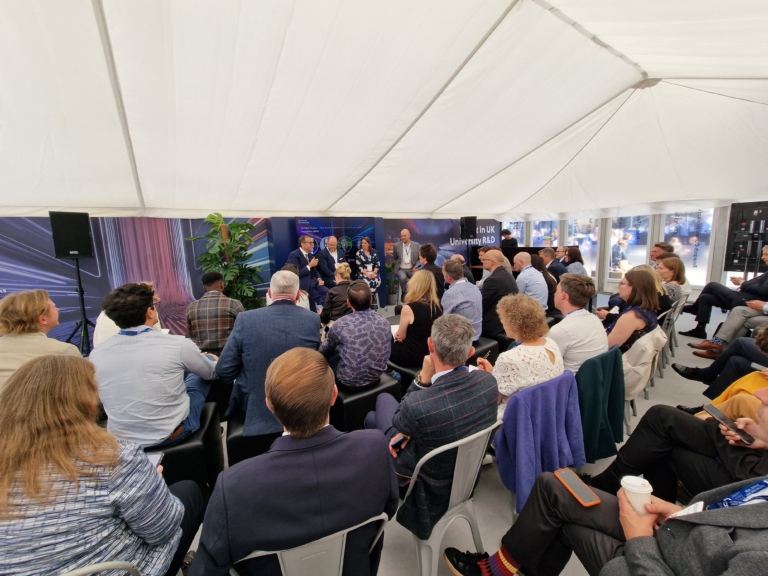Building on the strengths of previous years, it is no surprise that 2023 has been a fruitful (albeit challenging) year for Midlands Innovation Health (MI Health) and our partners. To celebrate those successes, to recognise the fantastic teams that have delivered them, and to look forward to more exciting opportunities in the year to come, we offer this short summary with the thanks of the MI Health team.
MI Health activities
For us, as a team, 2023 has seen a lot of changes, welcoming in a number of new representatives – Professor Neil Hanley at the University of Birmingham, Professor Clive Roberts (interim) and recently Professor Sube Banerjee at the University of Nottingham, and Professor Gavin Perkins at the University of Warwick. This acted as a catalyst to renew our efforts to further engage at a local level to demonstrate the value of collaboration and regional working across our partners and communities.
As part of our continued commitment to tackle inequalities in the region, MI Health has played a key role in convening the Integrated Care Systems (ICS) in the region by hosting twice yearly Midlands ICS Research and Innovation Workshops. Now in its second year, the latest workshops focused on Connectivity and the Midlands Health and Care Inequalities Policy Commission preliminary findings, and Social Prescribing. MI Health also presented the early findings of the Policy Commission to MPs and Lords at the Midlands Engine All-Party Parliamentary Group in May. These interactions are part of programme of activity to increase awareness of inequalities in the Midlands and the priorities for change to tackle them, with key stakeholder who can help influence opportunities for positive change that our report recommends. The full Policy Commission report, including detailed actions and future research needs, will launch early next year.
Building on this, 2023 has been a year for organising and supporting fantastic events across the partnership. MI Health has delivered a range of virtual and in-person conference to bring together and showcase research opportunities across the region. These include working with the University of Nottingham to host Wellcome’s Discovery Research Midlands conference in March, which saw nearly 200 researchers from across the Midlands hear about research funding opportunities that Wellcome has to offer. Another highlight event, developed with Midlands Innovation Immunology Network, saw the successful virtual launch of a new Midlands Extracellular Vesicle (EV) Network in September, providing collaborative presentations and discussions amongst almost 100 participants.
We also continue to engage with national and regional organisations to support and promote the Midlands Health and Life Science sector. This includes representing our stakeholders within the renewed Midlands Engine Health, Care and Life Sciences Advisory Board and Working Group, as well as membership in the UK Life Science Cluster of Clusters. The latter of which, saw us supporting the organisation of the high successful UK Life Science Investment Summit in March, which brought together leading investors and innovation support infrastructure.
Key collaborative successes for partners
Formally announced at the end of 2022, this year started with fantastic activity across the three newly funded Midlands Biomedical Research Centres at Birmingham, Leicester and Nottingham. With expanded partnerships (including the University of Aston, Keele and Loughborough) built into the new structures, this latest round of National Institute of Health and Care Research (NIHR) funding invested almost £80million in life-changing research in cancer, mental health, diabetes, dementia and infectious diseases over the next five years.
In April, HDRUK Midlands secured a further five years of funding to extend their network beyond the existing university community, with the aim of improving health through uniting the healthcare and data science communities across the region. This is a fantastic opportunity for the region, and MI Health will continue to support this network and its activity, for example, the HDR UK Midlands Regional Community Platform and Health Inequalities and Diversity in Health Data Science Webinar.
May saw the exciting announcement of the Midlands element of the UK Mental Health Mission to improve the speed and accuracy of diagnosis and increase the use of new technologies, as well as novel treatment approaches. The £9.9m in NIHR funding will enable the establishment of the Midlands Translational Research Centre of Excellence, co-led by the University of Birmingham with Birmingham Women’s and Children’s NHS Foundation Trust and Birmingham and Solihull Mental Health NHS Foundation Trust, with reach across the Midlands through the five years’ funding.
Adding to the NIHR awards, the Midlands Liver Research Alliance was launched in July between the NIHR Leicester, Nottingham and Birmingham Biomedical Research Centres. The Alliance will work with the public and healthcare professionals to identify research priorities around liver disease.
In September, the 70-bed National Rehabilitation Centre received formal Government approval for the new £105m clinical rehabilitation programme. The NHS facility, hosted and delivered by Nottingham University Hospitals NHS Trust, is being built alongside the Ministry of Defence facility, creating opportunities for shared learning. The Centre will utilise the innovative rehabilitation techniques deployed by the Ministry of Defence for injured personal to treat NHS patients more quickly and effectively. Loughborough University and the University of Nottingham are leading the academic partnership, which will deliver the research, innovation and training, and is keen to bring in further regional and national organisations. Activity is already underway, including ‘Revolutionising Rehabilitation’ at the Royal Society Summer Exhibition.
October also proved to be a brilliant month, with the West Midlands Health Tech Innovation Accelerator going live, pumping £14m of investment into the sector to supercharge the innovation of healthcare technologies. Three MI Health partners (Universities of Aston, Birmingham and Warwick) are collaborative across research, clinical, industry and government organisations to addressing the challenges of bringing new medical and healthcare technologies into the UK market.
Finally, in November, the NIHR announced the creation of three new HealthTech Research Centres (HRCs) in the Midlands, led by local NHS Trusts with MI Health partner support. Each £3M Centre will work with businesses to support the development of medical devices, diagnostics and digital technologies in specific areas: Mental health (Nottinghamshire Healthcare NHS Foundation Trust), Rehabilitation and assistive technologies (Nottingham University Hospitals NHS Trust), and Trauma and emergency care (University Hospitals Birmingham NHS Foundation Trust).
Partner highlights
MI Health partners have also made many outstanding individual achievements this year. These include:
Aston University receiving approval for its Medical School, being awarded two European Research Council grants (early interventions to prevent dementia onset (€2.2M), and attitudes to public health policies (€1.5M)), and announcing the upcoming Aston Health Services Hub as part of a new impact-focused 2030 strategy, offering health and wellbeing services for all students and the local community.
The University of Birmingham acting as lead academic partner for a new £5m NIHR Health Determinants Research Collaboration (HDRC) awarded to Sandwell Council. This programme will enable the council to develop the capacity and culture to research wider factors that influence health and wellbeing, such as education, employment, and housing. This award follows in the footsteps of the existing Coventry HDRC (delivered by partners including the University of Warwick).
The University of Leicester leading the $3million NIHR-funded PERFORM (Personalised Exercise-Rehabilitation For people with Multiple long-term conditions (multimorbidity)) trial aiming to help people with multiple chronic health conditions. The university is also partnering with the Public Health Foundation of India on a £10million project to improve healthcare in the subcontinent.
Keele University officially opening two new multi-million pound buildings: the veterinary school building, delivering high-quality facilities enabling the training of the next generation of veterinary surgeons, and the Innovation Centre, focused on harnessing and developing digital technology that will place the region at the heart of the UK’s digital revolution.
Loughborough University opening the £9m SportPark Expansion, which provides environmentally future-proof accommodation for innovative sports organisations collaborating around the university’s world-leading research capabilities, facilities, performance base and living lab of athletes.
The Universities of Nottingham and Warwick both achieving success within the BBSRC £18million investment in world-class frontier biosciences. Focusing on Glycosaminoglycans (biomolecules that play critical roles in a number of biological processes) and bacterial cell walls (of which little is known about their functions at a molecular level), these projects will tackle bold challenges with the aim of ‘uncovering the fundamental rules of life’.






